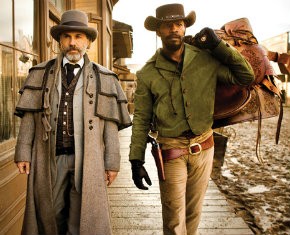Vengeance is mine

Near the end of Django Unchained, a freed slave named Django rides across a Mississippi plain, planning to wreak vengeance on the plantation owners holding his wife captive. All the visual symbols of a western finale are present: a lone hero set in a barren landscape, a horse worked to a lather, a gun in a holster and a cowboy hat cocked back. Salvific undertones are made explicit in the pulsating rhythms and lyrics of the accompanying song by John Legend: “I’m not afraid to do the Lord’s work / You say vengeance is his, but I’m gonna do it first.”
Perhaps Quentin Tarantino’s most controversial film yet, Django Unchained is a mashup of western, comedic, blaxploitation and rogue hero tropes. The result is an irreverent, profound and problematic exploration of America’s original sin and the power of a revenge fantasy.
Django (Jamie Foxx) is bought and freed by a German bounty hunter, Dr. King Schultz (Christoph Waltz), who needs Django’s help in identifying three fugitives. The three men used to be Django’s overseers. When it turns out that Django is a prodigy with a gun, the two form a partnership: Django will bounty hunt for a season with Schultz and then Schultz will help him rescue his wife, Broomhilda (Kerry Washington), from the charming but sadistic Calvin Candie (Leonardo DiCaprio), to whom she was sold when she and Django tried to run away from their original owners.




